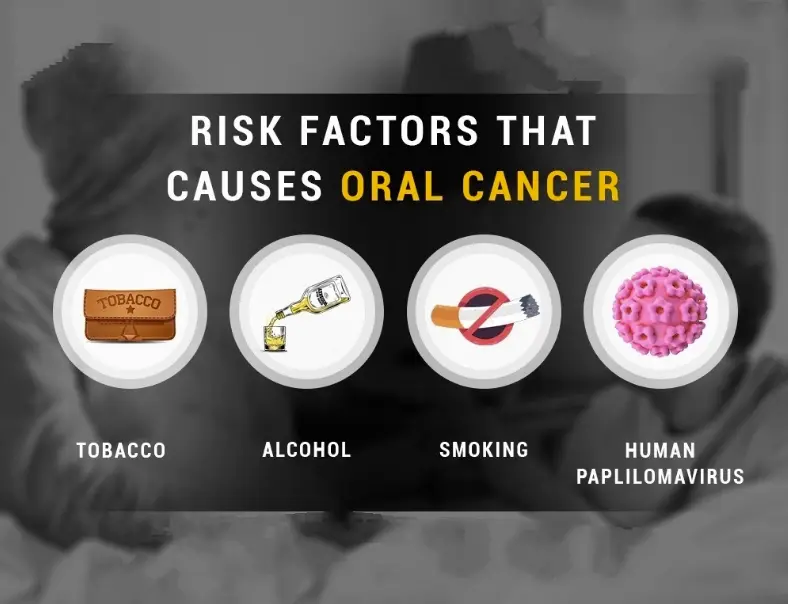Welcome to our in-depth exploration of oral cancer risks and symptoms. Are you aware of the factors that increase your chances of developing oral cancer? Do you know how to identify the early signs of this silent disease? In this article, we will provide you with valuable insights into the risk factors associated with oral cancer and discuss the crucial symptoms that you should never ignore. So, let’s delve deeper into this topic to ensure you know how to protect yourself and your loved ones.

Key Takeaways:
- Understanding the risk factors associated with oral cancer is essential for prevention.
- Knowing the common symptoms of oral cancer can lead to early detection and improved treatment outcomes.
- Prevention measures, such as practicing good oral hygiene and avoiding harmful lifestyle choices, can reduce the risk of developing oral cancer.
- Regular oral cancer screenings and check-ups play a crucial role in early detection and treatment.
- Supporting oral cancer research and raising awareness can contribute to advancements in treatment options and patient support.
Recognizing Oral Cancer Symptoms
In this section, we will focus on the specific symptoms that could indicate the presence of oral cancer. It is important to be aware of these symptoms as early detection can significantly improve treatment outcomes. By understanding the signs to watch out for, you can take proactive steps and seek medical attention if necessary.
Five Signs of Oral Cancer
Here are five common signs of oral cancer that you should be aware of:
- Persistent Mouth Sores: If you have a sore in your mouth that doesn’t heal within two weeks or keeps coming back, it could be a sign of oral cancer.
- Any unexplained bleeding in your mouth, including bleeding from gums, tongue, or throat, should be investigated further.
- Oral cancer can cause pain or discomfort in your mouth, throat, or ear. If you experience any persistent pain or discomfort, it is important to get it checked.
- If you have difficulty swallowing or speaking, it could be a sign of oral cancer. This symptom should not be ignored and requires medical attention.
- Notice any lumps or thickening in your mouth, throat, or neck? It’s essential to have them evaluated as they can be indicative of oral cancer.
Remember, these symptoms are not exclusive to oral cancer and can sometimes be caused by other conditions. However, if you experience any of these symptoms, it’s essential to consult with a healthcare professional for a proper diagnosis.
How Does Oral Cancer Start?
Oral cancer often starts in the cells lining the mouth or lips. Over time, these cells can develop abnormalities or mutations that cause them to grow and multiply rapidly, forming a tumor. Factors such as tobacco and alcohol use, excessive sun exposure, human papillomavirus (HPV) infection, and a weakened immune system can increase the risk of oral cancer development.
It’s important to note that not everyone with risk factors will develop oral cancer, and some people without known risk factors may still develop the disease. Regular dental check-ups, self-examinations, and awareness of the symptoms can significantly aid in early detection and improve treatment outcomes.
| Prevention Tips | Details |
|---|---|
| Avoid Tobacco and Alcohol: | Avoid or limit the use of tobacco products and excessive alcohol consumption, as they are major risk factors for oral cancer. |
| Protect Yourself from UV Radiation: | When spending time outdoors, especially in sunny areas, protect your lips and skin from excessive UV radiation by using sunscreen and wearing protective clothing. |
| Maintain Good Oral Hygiene: | Regularly brush and floss your teeth, and visit your dentist for routine check-ups. Good oral hygiene promotes overall oral health and can aid in the early detection of any abnormalities. |
| Get Vaccinated: | If eligible, consider getting vaccinated against HPV, as it is a known risk factor for oral cancer. |
| Monitor Your Oral Health: | Perform regular self-examinations of your mouth and be aware of any changes or persistent symptoms. Report any concerns to your healthcare provider. |
Managing and Treating Oral Cancer
When it comes to oral cancer, timely and effective treatment is crucial. In this section, we will explore the available treatment options for oral cancer and provide insights into its overall treatability. Additionally, we will discuss stage 1 mouth cancer, the earliest stage of the disease, and its specific characteristics.
Treatment Options:
Oral cancer treatment typically involves a multidisciplinary approach, combining different methods to address the disease. The treatment plan depends on various factors such as the stage of cancer, the location and size of the tumor, and the patient’s overall health.
Some common treatment options for oral cancer include:
- Surgery: Surgical intervention aims to remove the tumor and any affected nearby tissue. Depending on the extent of the cancer, the surgeon may also remove nearby lymph nodes.
- Radiation Therapy: This treatment involves the use of high-energy radiation beams to destroy cancer cells. It may be used as the primary treatment or in combination with surgery or chemotherapy.
- Chemotherapy: This treatment involves the use of drugs to kill cancer cells. It can be administered orally or intravenously and is often used in combination with surgery or radiation therapy.
Treatability of Oral Cancer Risks:
The treatability of oral cancer depends on various factors, including the stage at diagnosis, the location and size of the tumor, and the patient’s overall health. While outcomes vary on a case-by-case basis, early detection and treatment significantly increase the chances of successful treatment and recovery.
Stage 1 Mouth Oral Cancer Risks:
Stage 1 mouth cancer represents the earliest stage of the disease. At this stage, the tumor is usually small and localized, with no spread to nearby lymph nodes or other distant parts of the body. Treatment for stage 1 mouth cancer is generally less aggressive and has a higher rate of success, resulting in favorable outcomes for many patients.
It’s important to note that each case of oral cancer is unique, and treatment plans should be tailored to individual needs. Consulting a healthcare professional specializing in oral cancer is essential for accurate diagnosis and personalized treatment recommendations.
For a comprehensive understanding of oral cancer treatment options, check out the table below:
| Treatment Method | Description | Effectiveness |
|---|---|---|
| Surgery | Removal of the tumor and affected tissue | Varies depending on the stage and size of the tumor |
| Radiation Therapy | High-energy radiation beams to kill cancer cells | Effective in targeting localized tumors |
| Chemotherapy | Drug treatment to kill cancer cells | Used in combination with surgery or radiation therapy |
Preventing Oral Cancer and Supporting Research
When it comes to maintaining good overall health, oral health plays a crucial role. It is not just about having a bright smile; it also has a significant impact on preventing oral cancer. By prioritizing oral hygiene and regular dental check-ups, you can take proactive steps towards oral cancer prevention.
One of the key aspects of oral cancer prevention is undergoing regular oral cancer screenings. These screenings are essential because early detection can significantly increase the chances of successful treatment. By identifying any abnormalities or potential signs of oral cancer during these screenings, healthcare professionals can take immediate action, if necessary.
Supporting oral cancer research initiatives and organizations is crucial in combating this disease. The funds raised through these efforts help in advancing oral cancer research, exploring innovative treatments, and raising awareness about the importance of oral health. Additionally, these organizations provide invaluable support, resources, and emotional assistance to individuals and families affected by oral cancer.
Also, Reads More>>>Gorillaz Band




